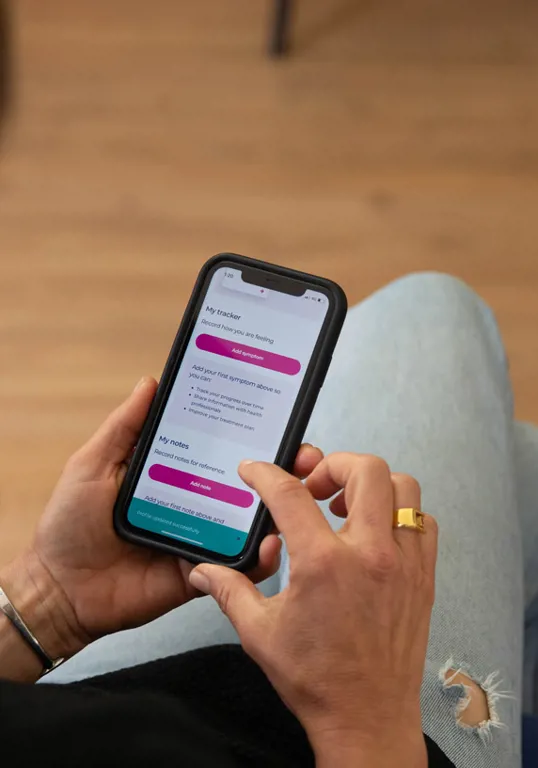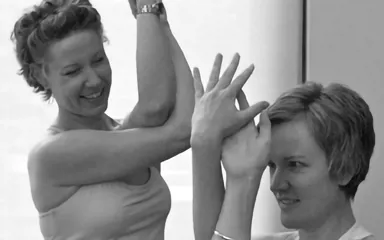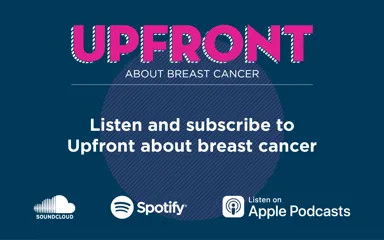Kellie Curtain [00:00:08] Let's be upfront about how to plan for and recover from breast reconstruction surgery. It's important to consider your lifestyle and what activities you want to be able to do after a breast reconstruction and also how you want to feel. The right exercise, pre and post surgery can aid recovery and also make a big difference to your well-being. Joining us is Dr. Deidre McGhee, a physiotherapist and researcher at Breast Research Australia at Wollongong University and Jodi Steel, who had a breast reconstruction two years ago and knows what a big difference asking the right questions and doing exercises can make to the final outcome. Welcome to you both. Okay. So it's easy to say let's prepare for your breast reconstruction. Sometimes that's easier said than done, isn't it Deirdre?
Deirdre McGhee [00:00:58] Definitely. Definitely. I think there's so much going on for women that there's so many things that their whole world's been turned upside down, so many things they have to consider. And this is one factor of many factors that they need to consider.
Jodi Steel [00:01:12] Yeah. And so for me, you know, my experience was that within a period of 10 days, I was told I had cancer, that they were going to have to take my breast off and clear out my lymph nodes. And I had to decide if I was going to be a breast reconstruction. I didn't even know which way was up. I had to deal with telling my kids, telling my family, closing things down at work and, you know, trying to decide, goodness me, you know, what sort of breast reconstruction I want to have was like way down the list. I didn't even know that the different sorts were going to have a different impact on me.
Kellie Curtain [00:01:48] That must be fairly common, Deirdre?
Deirdre McGhee [00:01:51] I think, for the women that are having an immediate breast reconstruction, definitely. Women who are having our delayed reconstruction have more time to investigate, more time to talk to other women, to get more information and make make different decisions or make more informed decisions. But the women that are having an immediate, it's a bit of a rollercoaster.
Kellie Curtain [00:02:11] Yes. So for those that are having immediate and they don't have that time to prepare, so to speak, there's still a lot they can do post-surgery, though, immediately post surgery to not only aid their immediate recovery, but to give them the best long term results.
Deirdre McGhee [00:02:31] There's these exercises that the all women will be given after their surgery to promote their circulation and to start to get their shoulder moving. They're also guided by the breast care nurses of the things that they can do and the things they should avoid doing, particularly in the first weeks after the surgery. And they really need to pay attention to those guidelines so that they don't compromise the surgery that the surgeon's done and they minimize the risk of any complications and really maximize their recovery. But these exercises are really important for them to do. And I think the problem is women don't seem to know how long they should do them for. And often they don't really understand why they need to do them. So they may not take them seriously enough.
Kellie Curtain [00:03:19] And I think it's like the pelvic floor exercises in that you know you should do them, but you sort of don't. And women that we have spoken to go yes, I think I think someone's showed me some exercises in a hospital and then they're like, I was feeling okay, so I didn't really do them anymore. What is the reality? Like what difference can it actually make when you do daily and actually four times daily exercise post-surgery?
Deirdre McGhee [00:03:51] From a circulation point of view those exercises where they pump the hand and bend their elbow up and down. So they are aiming to promote the circulation, to promote the blood flow, to promote the healing. They're also helping to mobilize the lymphatic flow, which can be compromised, especially if woman's had axillary clearance or she's had lymph nodes removed. And that's really important to minimize the risk of developing lymphoedema. So she really needs to have consultation with the lymphoedema specialist and monitor that for a long time after the surgery. The other exercises for the shoulder need to be progressed until she returns back to her sport or her work or whatever physical function that she decides to do with her shoulder. Or if it's tissue based and they've taken it from her abdominal wall until that's fully recovered and that fully recovery, we mean returning to previous function. That's what we mean by recovery.
Kellie Curtain [00:04:53] Because a lot of women tend to suffer through pain and decide that, well, it was never going to be as good as it was beforehand. Can they actually expect their body to be as good post surgery as it was pre?
Deirdre McGhee [00:05:08] They may not get complete recovery, but if they keep working at the exercises and gradually progress them, there's no way you're going to go from doing an exercise where you walk your fingers up a wall to playing tennis. There's a big jump between those two things. So it must be a very gradual progression. So when women ask, I don't know what I should do next, say you would increase the range and increase the load from what you're doing now in a slow stepwise progression.
Kellie Curtain [00:05:42] So the first step, really, once you're home from hospital, you've really got to make sure you've prepared your home, don't you, for your return. How did you do that, Jodi?
Jodi Steel [00:05:52] Yes. So I did a few things. I have a couple of teenagers at home and they had a lot of issues dealing with my cancer. So their help was unreliable. I couldn't really depend on them and my husband travels a lot for work. So I had to be set up for doing things on my own. So we moved a lot of the things that I would need on a regular basis, particularly the heavy things that were up high in the kitchen or the bathroom. We moved those down a lot lower so that I could get to those. I organized for a cleaner to come. And I filled the freezer with meals and I also had community support. I had two meals a week, which was fantastic. And we organized a fold up washing line so that I could do some small washing. Not heavy stuff, but I could do small washing and hang that out for myself. And I think that sort of thing was really important because it meant I could be independent. And that was really good for my mental recovery in terms of being confident about what I could do and that I was actually going to become myself again after all this was finished.
Kellie Curtain [00:06:57] So Deirdre, it's really important to make small adjustments, but smart adjustments.
Deirdre McGhee [00:07:02] I think the breast care nurses are great at giving women guidelines, but I think it's really hard for women to take all this information in post-op or around their surgery because it's so stressful and there's so much going on. So I think there needs to have a resource where women can go back and see via video, something very easy to absorb, watching how another woman made changes. I think that is really helpful.
Kellie Curtain [00:07:30] One of the key issues that our women say to us post surgery is their difficulty in sleeping. You've got drains. Tenderness. And they're not sleeping properly. How important is sleep to your recovery?
Deirdre McGhee [00:07:51] Sleep's absolutely vital for your healing. You'll do a lot of your healing during your sleep. So it's very important that we help women to sleep as much as they can. And physical discomfort is one factor which will inhibit sleep. But it's one factor we should be able to do something about. If we set a woman up properly in a firm bed, a higher bed, use pillows so her arms are supported. So there's ways. It's a solvable strategy.
Kellie Curtain [00:08:24] That just requires a bit of preplanning, too, doesn't it?
Deirdre McGhee [00:08:27] Yes. To set her up. But it's not common that this is even brought up, because the research that we've done at Breast Research Australia, we found six months down the track two thirds of women are not sleeping, all because of physical discomfort. Not because my brain's racing or I'm worried or I'm... but because I am uncomfortable to sleep. So we really need to help women to become more comfortable so that they will sleep better.
Kellie Curtain [00:08:58] Some of the other things that your research has discovered is that women really are suffering in silence long term.
Deirdre McGhee [00:09:07] We were really surprised about the outcomes in terms of their physical problems that they were suffering six months, 12 months down the track and the limitations to their physical activity, six months, 12 months down the track. It was ... 60 per percent of women complained that they had bra discomfort that to a moderate to severe level, not just oh my bra's a bit uncomfortable. Women were not wearing bras because it was too uncomfortable. So that was much, much worse than we ever expected it to be.
Kellie Curtain [00:09:44] Was that some of the discomfort that you experienced?
Jodi Steel [00:09:47] Look, that was some of it because of the amount of skin that had to be removed. I had cancer close to the skin, so they had to take the skin as well. I've got scars on the side and a lot of the bras rub on there, which is uncomfortable. I also have discomfort from the reconstructed breast pulling on this under my arm and around into my shoulder blades. So I have to wear a bra to sleep, which I never had to do before. But there's other things like for a long time after surgery, you have to sleep on your back. Now, if you're a side sleeper like I am, that's really uncomfortable. It's hard to get to sleep. It's hard to stay asleep. And you're also worried about not rolling onto the side that doesn't have the lymph nodes because everybody says, you know, don't sleep on that side. So you're trying not to roll over that side. So you sort of half alert when you're trying to fall asleep. So I think there's a whole range of factors. It does improve a bit over time. But some of those you know, my my reconstructive surgeon said to me, yeah, all a lot of the women complain about that that side of their chest wall, because that's where we have to pin the tissue too. So it's just a case of you know, it is getting better gradually over time. But yeah, we do tend to just put up with it.
Kellie Curtain [00:11:05] So who do you speak to Deirdre, if you are having trouble sleeping? It sort of sounds you don't want to ring your breast surgeon over that one. You don't want bother them with oh, I'm having trouble sleeping. Who do you go to with what many might seem ... I've just had breast cancer. I'm not going to ring up and complain about the fact that I can't sleep.
Deirdre McGhee [00:11:26] In the acute period, post op, your breast care nurse will be able to advise you on strategies other women have found successful. So it won't be one strategy that's going to save every woman. So she'll be able to tell you about different strategies other women have used. As you get longer term, though, so months down the track, like Jodi still having problems sleeping. A physio would have some better strategies in looking at your thoracic cage. Maybe that's too stiff. Maybe it's your shoulder. That's part of the problem. So there will be other things that can be the factors involved rather than the whole pillow set up that may be immediately post op.
Kellie Curtain [00:12:08] How did exercise aid your recovery Jodi?
Jodi Steel [00:12:13] Exercise was fantastic. I am really, really pleased that I did all the preparation that I did. So as you were talking about before, the importance of working on your shoulder. So I did all of that. I did things with my abdomen so that my abdomen was strong because I knew straight after my reconstruction, which was the tummy flap reconstruction, I would be bent over for a day or two. So I needed to strengthen my my thighs and strengthen my lower back and my abdomen so that, you know, when it was post surgery, I could still bend over. And I you know, within three days after surgery, I was walking a lap of the corridor multiple times a day in the hospital. And the doctor and the nurses could not believe how quickly I healed from the surgery. I was able to sit up to have my meals in hospital. And when I went home, my surgeon and I had already worked out before my surgery the little walks that I could do and how I could increase those so I can actually get outside and I could get some fresh air. And that just made the whole thing go better because it wasn't just that physical moving around and getting the circulation going, which I also concentrated on before surgery. I did a lot of cardio work to make sure that my body was physically fit to recover. But post-surgery I could get out. It was something else that I could do, because that's one of the things I found as really important through cancer is to focus on what I can do, not to focus on what I can't do, because there's plenty of that. Focus on what I can do. And I could do that so I could go for a walk, I could be outside, I could hear the birds singing, and that all really, really helped. So from a physical perspective and from a mental perspective, I recovered much, much better from the surgery and I was back in the pool ... Trying to think. Gosh, I think it was about eight weeks I was back in the pool, so that was pretty good, I think.
Kellie Curtain [00:14:20] Did you have any issues post surgery that you didn't expect?
Jodi Steel [00:14:24] Yeah, I did. I yeah, I woke up in the hospital the day after my surgery and looked down at my arm, the one that didn't have the lymph nodes. And I had a sausage connected to my shoulder and a little football on the end of my arm. And that was not at all what I expected. I I looked at my other arm and it was a little tiny bit swollen. But, you know, I could still make a fist and all that sort of stuff on my left hand. I could only make a letter C shape. So given that the lymphoedema was the thing that I was most concerned about. Sounds strange. But for me, that was the thing that I was most concerned about with all the breast cancer was, you know, I was always pretty sure I was gonna survive this. So therefore, I wanted an arm that was going to function so I could still do all the things I liked doing, including bushwalking, without having to wrap myself in cotton wool. So waking up to this massive arm, I was really, really concerned about it. So it was. Yeah, that was that was not at all expected.
Kellie Curtain [00:15:26] Lymphoedema is a very big issue for a lot of women. Can the right exercises reduce the effect or even prevent it from happening?
Deirdre McGhee [00:15:38] Early intervention is the absolute key here. And I think that's where Jodi was really lucky with her experience that she got onto it so early and that she actually had a lymphoedema physio who she was seeing after her mastectomy. So Jodi had a delayed reconstruction. So she had this time gap between the mastectomy and then the reconstruction. And she had a physio that she was under... do you want to tell the story, Jodi?
Jodi Steel [00:16:10] So. So Emily took all sorts of measurements. She took the measurements with the tape measure so she knew how my arm was kind of tracking, which was really important to me to see that everything was fine. So we did a set of measurements just before my reconstructive surgery so that we knew my baseline. Then I went back to her and she was like, oh, well, okay. So but at least she could see how it was progressing. And as time over time, as it reduced, we could see that I was actually making progress. But she had said to me right back in the very first time I met with her and I'd kind of half forgotten it. And she reminded me again when I went to see her after my reconstruction that the earlier you get in, the better. And if you get in early and you work hard on it, you can actually get rid of it. And so I did five months of very hard work. I did exercises. I did massage, I did decompression. I did swimming. I did all sorts of stuff. But, you know, it paid off five months down the track. No lymphoedema. I don't have to wear a sleeve. I'm fine. My other hand, you wouldn't even know to look at me. They're both perfectly fine.
Kellie Curtain [00:17:23] So Deirdre I think the key message here is even for those who have immediate reconstruction, they don't have the time to prepare, so to speak. The acute period. What is that acute period, how long is it and what do they actually need to do?
Deirdre McGhee [00:17:42] Well, lymphoedema can develop in any time two years after your surgery, so that acute period could be two years after your surgery. But when we say acute, we mean that if you see any changes, if your arm feels heavier or tighter, you notice any swelling, then immediately you need to be in contact with... If it's immediately post op your breast care nurse, or a lymphoedema physio or lymphoedema therapist. That you see someone about it as soon as possible. Because the earlier that we get in to act on lymphoedema makes a huge difference in terms of our success in overcoming it.
Kellie Curtain [00:18:28] Is that the same for other issues that women might face as well? The earlier intervention?
Deirdre McGhee [00:18:33] It's so much easier to work on range of motion if we do these gradual progression in terms of your shoulder or your back or any part of your trunk. So if we get in early and gradually move you. It is so much easier than a woman six months down the track who comes in and can barely lift around above horizontal. And we're starting at six months or a year or 18 months time. Sometimes a woman's frustrated and now her shoulders just getting sorer and sorer and then she can't sleep that then where we're starting. That's a lot harder than if we started with a woman post op and got her on a gradual progression.
Kellie Curtain [00:19:14] So your key message to the women listening?
Deirdre McGhee [00:19:17] They need to take a proactive approach to their physical recovery in terms of their movements, of their shoulder and their back or their trunk, in terms of their muscle strength, in terms of their flexibility and in terms of their circulation. They don't expect that they'll just physically recover. They actually pay attention to it, monitor it and proactively work at it.
Kellie Curtain [00:19:42] So they are really in control. And Jodi, What's your biggest learning?
Jodi Steel [00:19:49] Oh, I think.
Kellie Curtain [00:19:50] You put in a lot of hard work.
Jodi Steel [00:19:52] Exactly. I think. I think having looking at firstly listening to your body, observing what your body's doing and listening to it because, you know, we're so good at just pushing through and we keep pushing ourselves and sometimes we push too hard. And I found that there would be days when I would do too much. And I really noticed that the next day. So I'd just back it off a little bit and then, you know, go again. There were times when I didn't really know what was the right amount and what was too much. So I asked my physio. And I was really pleased because then I would get some things, oh, you know, look out for these or look out for that and then you'll know you're doing about the right amount. The other thing I would say to women is keep going. Don't give up. Don't lose hope. Measure yourself. You know, have a look at, you know, how am I today and how am I in a week? How am I in a month? Am I actually making progress? Because if you look just on every day, your body changes. Day to day, you get tyred. You had a terrible sleep. You might actually go backwards from day to day. And if you focus on that, then you can become very demoralised and it's hard to keep going. Whereas if you focus on okay, over the week I actually got a bit better over a month. Yeah. Look how far we've come. That's really inspiring. And you can actually keep going then.
Kellie Curtain [00:21:06] I think it is very inspiring to encourage women to really take charge of their recovery. Thank you to you both for joining us.
Deirdre McGhee [00:21:14] Thank you.
Jodi Steel [00:21:15] Thank you.
Kellie Curtain [00:21:16] Thanks to Deirdre and Jodi for sharing their knowledge and experience on the importance of planning for and recovering from breast reconstruction surgery, an episode made possible with thanks to Dry July. If you'd like more information about the right exercises to do for your particular type of reconstruction, there are a suite of videos on BCNA's website bcna.org.au. And the opinions of our guests are welcome, but not necessarily shared by BCNA. And of course it's always best to contact your health professional with your concerns. Until next time. I'm Kellie Curtain. Thanks for being Upfront with us.



















Listen on